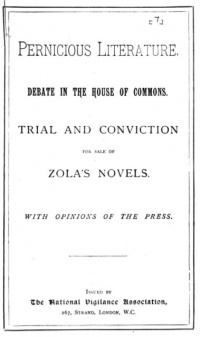Vizetelly trial
From The Art and Popular Culture Encyclopedia

|
Related e |
|
Featured: |
The Vizetelly trial was a British obscenity trial involving the publisher British publisher Henry Vizetelly and the novels of Émile Zola. Held on October 31, 1888 at the Old Bailey, Vizetelly pleaded guilty to the indictment concerning La Terre, Nana, and Pot-Bouille, and was fined £100 and had to post a £200 bond to be of good behavior for twelve months. One year later, on May 30 1889, Vizetelly was again brought to trial and Henry Vizetelly was sentenced to three months imprisonment.
Contents |
Background
In the 1880s, British publisher Henry Vizetelly began to issue unabridged mass-market translations of French realist novels that endangered the moral and commercial influence of the circulating libraries around this time. In 1888, the circulating libraries fought back by encouraging the House of Commons under leadership of Samuel Smith to implement laws to stop 'the rapid spread of demoralising literature in this country'.
First trial
In May 1888, the MP Samuel Smith tabled a motion in the Commons deploring "the rapid spread of demoralising literature" and naming Henry Vizetelly and Émile Zola as the chief culprits. Smith knew just what he felt about Zola: nothing more "diabolical" had ever been written by the pen of man, he told the House. Zola's novels were "inartistic garbage", "only fit for swine", characterised by "sheer beastliness" and amounting to "dirt and horror, pure and simple".
Vizetelly was brought to court by the National Vigilance Association (NVA) for 'obscene libel'. The charge arose due to the publication of the English translation of Zola's La Terre. George Moore stayed loyal to Zola's publisher, and on 22 September 1888, about a month before the trial, wrote a letter that appeared in the St. James Gazette. In it Moore suggested it was improper that Vizetelly's fate be determined by a jury of twelve tradesmen, explaining it would be preferable to be judged by three novelists. Moore pointed out that the NVA could make the same claims against such books as Madame Bovary and Gautier's Mademoiselle de Maupin, as their morals are equivalent to Zola's, though their literary merits might differ.
Second trial
A second case was brought the following year in order to force implementation of the original judgement and to remove all of Zola's works. This led to the 70-year-old publisher becoming a cause célèbre for the literary cause.
- Vizetelly was sentenced to three months' imprisonment. He was then sixty-nine years of age and suffering from a painful physical ailment. The sentence undoubtedly hastened his death (he died in 1894, a few years later). A petition, which finally secured his release, was signed by such notables as John Millais, John Gilbert, Harry Furniss, George du Maurier, Henry Morley, Geddes, Edmund Gosse, Richard Garnett, Frederick James Furnivall, John Addington Symonds, Leslie Stephen, Lytton Strachey, Havelock Ellis, Robert Buchanan, Thomas Hardy, George Moore, Hall Caine, Arthur Pinero, William Archer, Olive Schreiner, William Sharp, H. D. Traill, Arthur Symons, and many others.--The Victorian Conscience
References
- The Victorian Conscience The Victorian Conscience (1952) by Clarence R. Decker
- Anthony Cummins, 'Émile Zola's Cheap English Dress: The Vizetelly Translations, Late-Victorian Print Culture, and the Crisis of Literary Value', Review of English Studies 60 (2009): 108-132.
- Émile Zola, Novelist and Reformer, THE BRITISH PHARISEES 1884-1893 chapter

